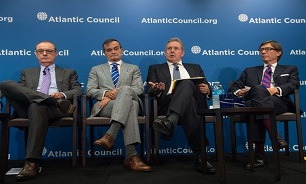EU Diplomats Back JCPOA, Speak Out against Trump
 Envoys from the European Union, Germany, France and Britain
laid out their arguments, stressing that the deal, also known as the Joint
Comprehensive Plan of Action (JCPOA), is working and Iran is complying with the
agreement, CNN reported.
Envoys from the European Union, Germany, France and Britain
laid out their arguments, stressing that the deal, also known as the Joint
Comprehensive Plan of Action (JCPOA), is working and Iran is complying with the
agreement, CNN reported.
The diplomats said the deal is in the national security interests of their countries, the Middle East and the world. They said a decision to walk away would undermine Western credibility, particularly with North Korea.
"We don't think it will be possible to renegotiate" the Joint Comprehensive Plan of Action, said German Ambassador Peter Wittig, who added that his country saw no practical way to do so.
Other parties to the deal are adamant that it won't happen, French Ambassador Gerard Araud told the audience at the Atlantic Council event where the envoys spoke.
At the UN General Assembly, during a meeting last week of all parties to JCPOA, he said, "there was a very clear message" from Iran, China and Russia "saying no way, there won't be any re-opening of the agreement, the agreement is working as it is”.
Stuart Eizenstat, chairman of the Atlantic Council's Iran Advisory Board for the Future of Iran Initiative, captured some of the unspoken feeling on the panel when he said at the opening of the event that "it now appears that Washington, rather than Iran, may be a bigger threat to the JCPOA."
Wittig said that engaging with Iran after the lifting of sanctions is "a legitimate and desirable goal" of the agreement because trade and regular contact "potentially binds us closer together" and could eventually change Iranian behavior. With "80 million people, you can't just wish it away," he said. "We want this Iran to gradually move to our world view."
He urged the Trump administration to consider the broader context of their actions. "What kind of signal would it send to North Korea," he asked. "It would send a signal that diplomacy is not reliable ... that would affect our credibility in the West when we're not honoring an agreement that Iran has not violated."
British Ambassador Kim Darroch said that UK Prime Minister Theresa May told Trump during the UN gathering that the UK supports the deal because "it's about our national security, we think we are more secure because of the deal”.
Darroch said he thought the administration is making headway in raising its concerns about Tehran. It has "changed the climate already on Iran," Darroch said, "so it's succeeding, we would say let's carry on with that, let's intensify those discussions, but let's keep the JCPOA."
Iran and the Group 5+1 (Russia, China, the US, Britain, France and Germany) reached the 159-page nuclear agreement in July 2015 and implemented it in January 2016.
Since the historic deal was signed in Vienna, the IAEA has repeatedly confirmed the Islamic Republic’s compliance with its commitments under the JCPOA, but some other parties, especially the US, have failed to live up to their undertakings.
